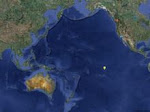“Hey! Hey, Cynthia! We have a visitor!” This is a story from our second week in the Marquesas Islands. We had just left Atuona on Hiva Oa the day before and spent the night at a sweet anchorage on the west side of Tahuata Island just a few miles south of Hiva Oa. We were the only ones anchored here, next to a near vertical wall of coconut palms, and across a little bay from the village.
 |
| A cliff of coconut palms on Tahuata Island. Notice the dinghy in the water for scale. |
It was Sunday morning and the sun was still struggling to peek over the green cliff. The sea was dark, but glass calm. We had slept in and enjoyed the still motion compared to the rolly anchorage of Atuona. I was surprised we had a visitor because most Marquesans attend church on Sundays. In many villages we have seen, the church is the most substantial building around, and going to a service is often touted in the guide books as a “must-do activity” for the tourists. Indeed, the singing is quite lovely.
In any case, we had a visitor – a young fisherman with a very masculine Marquesan name full of T’s and K’s and I’s. He had a fish and Glenn was trying to find out how much it would cost us to have fresh tuna for dinner that night. I spoke more French than Glenn, which is to say, I knew how to conjugate one verb – to want. I also brought out my French-English dictionary.
“Bonjour! Comment ça va?” (“Bonjour! How are you?”)
“Um… nous voulons ce poisson.” (“We want that fish.”)
Flipping through the dictionary, I found the word for “How much” and I made the international sign for money. After a bit of misunderstanding, I got that the fish was not for sale. Well, that was unexpected. He wanted it for himself, for sashimi. Hmmm. I wonder why he stopped by then… I guess he was just friendly!
Then, he offered to take me fishing. Just around the corner, he said was a great fishing spot. It wouldn’t take long. But, no, no, he (meaning, Glenn) should stay and watch the boat. We won’t be long. Hmmm. Well, why not? Okay!
 |
| Glenn thought to take a picture of us for evidence as I left on my fishing expedition without a radio. |
I know you’re all wondering now if this is a good story or a bad one. I’ll go ahead and kill the suspense right now. I got a fish. We weren’t gone very long. He was right – it was a great spot for fish. But, he didn’t want money. He wanted to trade. I wondered what I could offer to trade for a fish.
“Qu’est-ce que vous voulez pour le poisson?” (“What do you want for the fish?”)
I didn’t understand his answer and I had to consult my dictionary. “Fom,” he said. How do you spell that? Oh! “Femme.” Flip, flip, flip. Um, yeah, femme means woman.
This was the start of a painfully awkward but hysterical interchange between us as I had to consult the dictionary for pretty much every word. I was slowly translating by dictionary a man propositioning me in a small motorboat just around the corner from Glenn.
I tried playing stupid… “I don’t have any femme,” I said. “You! You are femme!” he said with a knowing but amused smile. He really was friendly and unthreatening. I’m sure he understood the chances that his charade would work were slim, but he was still giving it a shot. I found out that he was from the local village, and that it was made up of mostly men. So many villagers, particularly the women, had moved to Tahiti. That’s where the money is, so that’s where they went.
He allowed the conversation to drift away from his proposed trade for a while, but not too long. Finally, I said, “Autre chose.” (“Another thing.”) He frowned, shrugged, and said,
“Okay. You decide.”
“But, what do you need?”
“Femme.”
“No.”
“You decide.”
That got tedious.
After a little bit, we caught a fish. He pulled it in and dispatched it quickly, then turned his boat around heading back for Columbine. We continued the repetitive sequence of our conversation most of the way back. I would suggest something to trade, but nothing seemed to be right. Finally, I had a revelation! I know what he needs! Wasabi! He wanted his fish for sashimi, so he needs wasabi to go with it. And, I had noticed it is not a common item in the stores in Atuona.
“Est-ce que vous voulez Wasabi?”
“What is that?”
“Wasabi est pour sashimi!”
“Hmmm. Okay.” Shrug.
Well, he wasn’t excited about it, but I could tell he was a bit intrigued. He had never had it before, so maybe this could be a good trade after all! Unfortunately, all I had was some powdered wasabi, so I had to explain how to make it into a paste for dipping. He eyed the Ziploc bag of light green powder suspiciously. I had handwritten instructions “+ l’eau.” Maybe he could Google it…
In any case, I had had an adventure. And, we had a fish for dinner! Nemo got the tail as a prize, which he gnawed on rather uncertainly for a while. Overall, it was a fun day, but I’m sure there’s a moral to this story somewhere… Oh, yes. Beware of lonely young fishermen who come calling on Sunday morning. In fact, you can add pearl divers to that list as well. I guess I’m slow to learn sometimes.
 |
| Nemo tries to figure out how to deal with this fish that's as big as he is... |










